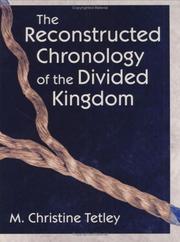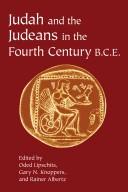| Listing 1 - 3 of 3 |
Sort by
|

ISBN: 1575065398 9781575065397 1575060728 9781575060729 Year: 2021 Publisher: University Park, PA
Abstract | Keywords | Export | Availability | Bookmark
 Loading...
Loading...Choose an application
- Reference Manager
- EndNote
- RefWorks (Direct export to RefWorks)
The common response to any attempt to read the chronological notations associated with the kings of Israel and Judah in the time of the divided monarchy is, perhaps, a shrug of the shoulders, or a statement to the effect that the problem is insoluble. Not only are the apparently contradictory-or confusing-notations of the MT a consideration, but the evidence of the other major versions seriously complicates any such undertaking. In the twentieth century, Edwin R. Thiele attempted to reconcile and wrangle all of the numbers into a semblance of order, with results that were far from convincing to his readers. Now Christine Tetley has attacked this knottiest of problems with fresh vigor and assayed a new solution. There is no doubt that this book will be controversial; nevertheless, it will be required reading for anyone who wishes to pin archaeological and historical data within the framework of an absolute chronology.
Jews --- Hebrews --- Israelites --- Jewish people --- Jewry --- Judaic people --- Judaists --- Ethnology --- Religious adherents --- Semites --- Judaism --- History --- Bible. --- Kings (Books of the Old Testament) --- Koenige (Books of the Old Testament) --- Könige (Books of the Old Testament) --- Königsbücher (Book of the Old Testament) --- Koningen (Book of the Old Testament) --- Melakhim (Books of the Old Testament) --- 222.6 --- 930.24 --- 933.22 --- 930.24 Historische chronologie --- Historische chronologie --- 933.22 Geschiedenis van het Joodse volk: Verdeeld Koninkrijk tot de val van Jeruzalem--(587 v.Chr.) --- Geschiedenis van het Joodse volk: Verdeeld Koninkrijk tot de val van Jeruzalem--(587 v.Chr.) --- History&delete& --- Chronology --- Samuelboeken. Boeken der koningen. David. Salomon. Elia. Elisa. Josias --- Chronology. --- Altes Testament --- König --- Geschichte. --- Chronologie. --- Jews. --- "Bible. --- Könige (Buch, 1.-2.) --- Israel (Altertum) --- Jewish question
Book
ISBN: 1575066475 9781575066479 1575062046 9781575062044 Year: 2021 Publisher: University Park, PA
Abstract | Keywords | Export | Availability | Bookmark
 Loading...
Loading...Choose an application
- Reference Manager
- EndNote
- RefWorks (Direct export to RefWorks)
"Almost every book in the Hebrew Bible mentions horses and chariots in some manner, usually in a military context. However, the importance of horses, chariots, and equestrians in ancient Israel is typically mentioned only in passing, if at all, by historians, hippologists, and biblical scholars. When it is mentioned, the topic engenders a great deal of confusion. Notwithstanding the substantial textual and archaeological evidence of the horse{u2019}s historic presence, recent scholars seem to be led by a general belief that there were very few horses in Iron Age Israel and the Israel{u2019}s chariotry was insignificant. The reason for this current sentiment is tied primarily to the academic controversy of the past 50 years over whether the 17 tripartite-pillared buildings excavated at Megiddo in the early 20th century were, in fact, stables. Although the original excavators, archaeologists from the University of Chicago, designated these buildings as stables, a number of scholars (and a few archeologists) later challenged this view and adopted alternative interpretations. After they {u2018}reassessed{u2019} the Megiddo stables as {u2018}storehouses, {u2019} {u2018}marketplaces, {u2019} or {u2018}barracks, {u2019} the idea developed that there were no place for the horses to be kept and, therefore, there must have been few horses in Israel. The lack of stables, when added to the suggestion that Iron age Israel could not have afforded to buy expensive horses and maintain an even more expensive chariotry, led to a dearth of horses in ancient Israel; or so the logic goes that has permeated the literature. Cantrell{u2019}s book attempts to dispel this notion. Too often today, scholars ignore or diminish the role of the horse in battle. It is important to remember that ancient historians took for granted knowledge about horses that modern scholars have now forgotten or never knew. Cantrell{u2019}s involvement with horses as a rider, competitor, trainer, breeder, and importer includes equine experience ranging from competitive barrel-racing to jumping, and for the past 25 years, dressage. The Horseman of Israel relies on the author{u2019}s knowledge of and experience with horses as well as her expertise in the field of ancient Near Eastern languages, literature, and archeology."--Back cover.
Chariots --- Horses --- Iron age --- Military art and science --- Military history, Ancient. --- Warfare, Prehistoric --- Prehistoric peoples --- Prehistoric warfare --- Ancient military history --- Ancient warfare --- Civilization --- Equus caballus --- Farriery --- Hippology --- Horse --- Domestic animals --- Equus --- Livestock --- Pachyderms --- Hinnies --- Mules --- Vehicles --- History. --- History --- Warfare --- Bible. --- Antico Testamento --- Hebrew Bible --- Hebrew Scriptures --- Kitve-ḳodesh --- Miḳra --- Old Testament --- Palaia Diathēkē --- Pentateuch, Prophets, and Hagiographa --- Sean-Tiomna --- Stary Testament --- Tanakh --- Tawrāt --- Torah, Neviʼim, Ketuvim --- Torah, Neviʼim u-Khetuvim --- Velho Testamento --- Criticism, interpretation, etc. --- Israel --- Antiquities. --- War horses --- Military history, Ancient --- Excavations (Archaeology) --- Kriegführung. --- Kavallerie. --- Warfare, Prehistoric. --- Military art and science. --- Iron age. --- Horses. --- Chariots. --- Archaeological specimens --- Artefacts (Antiquities) --- Artifacts (Antiquities) --- Specimens, Archaeological --- Material culture --- Archaeology --- Fighting --- Military power --- Military science --- Warfare, Primitive --- Naval art and science --- War --- Chargers (War horses) --- Warhorses --- Cavalry --- Training --- War use --- Bible --- Eretz Israel --- Israel (Altertum) --- Israel. --- Palestine --- Dawlat Isrāʼīl --- Država Izrael --- Dzi︠a︡rz︠h︡ava Izrailʹ --- Gosudarstvo Izrailʹ --- I-se-lieh --- Israele --- Isrāʼīl --- Isŭrael --- Isuraeru --- Izrael --- Izrailʹ --- Medinat Israel --- Medinat Yiśraʼel --- Stát Izrael --- State of Israel --- Yiselie --- Yiśraʼel --- Ισραήλ --- Израиль --- Государство Израиль --- Дзяржава Ізраіль --- Ізраіль --- מדינת ישראל --- ישראל --- إسرائيل --- دولة إسرائيل --- イスラエル --- 以色列 --- Erets Israel --- Erets Yiśraʼel --- Filasṭīn --- Palesṭin --- Erez Jisrael --- Paleśtinah --- Memshelet Paleśtinah --- Palestina --- Palästina --- Falastīn --- Palaia Diathēk --- Dzi͡arz͡hava Izrailʹ --- Middle East


ISBN: 1575065800 9781575065809 9781575061306 1575061309 Year: 2021 Publisher: University Park, PA
Abstract | Keywords | Export | Availability | Bookmark
 Loading...
Loading...Choose an application
- Reference Manager
- EndNote
- RefWorks (Direct export to RefWorks)
" During the past decade, the period from the 7th century B.C.E. and later has been a major focus because it is thought to be the era when much of the Hebrew Bible/Old Testament was formed. As a result, there has also been much interest in the historical developments of that time and specifically in the status of Judah and its neighbors. Three conferences dealing roughly with a century each were organized, and the first conference was held in Tel Aviv in 2001; the proceedings of that conference were published as Judah and the Judeans in the Neo-Babylonian Period. The second volume was published in early 2006, a report on the conference held in Heidelberg in July 2003: Judah and the Judeans in the Persian Period.Judah and the Judeans in the Fourth Century B.C.E. is the publication of the proceedings of the third conference, which was held in Muenster, Germany, in August 2005; the essays in it focus on the century during which the Persian Empire fell to Alexander the Great and the Hellenistic kingdoms came to the fore. "
Jews
---
Judaism
---
Hebrews
---
Israelites
---
Jewish people
---
Jewry
---
Judaic people
---
Judaists
---
Ethnology
---
Religious adherents
---
Semites
---
History
---
Bible.
---
Antico Testamento
---
Hebrew Bible
---
Hebrew Scriptures
---
Kitve-ḳodesh
---
Miḳra
---
Old Testament
---
Palaia Diathēkē
---
Pentateuch, Prophets, and Hagiographa
---
Sean-Tiomna
---
Stary Testament
---
Tanakh
---
Tawrāt
---
Torah, Neviʼim, Ketuvim
---
Torah, Neviʼim u-Khetuvim
---
Velho Testamento
---
Criticism, interpretation, etc.
---
Judaea (Region)
---
Yehud (Persian province)
---
Erets Yehudah (Region)
---
Ereẓ Yehudah (Region)
---
Judah, Land of (Region)
---
Judea (Region)
---
Land of Judah (Region)
---
Yahūdhā (Region)
---
Yehuda (Region)
---
933.32
---
933.32 Geschiedenis van het Joodse volk: hellenistische tijd--(332-63 v.Chr.)
---
Geschiedenis van het Joodse volk: hellenistische tijd--(332-63 v.Chr.)
---
Conferences - Meetings
---
Judentum.
---
Achämeniden
---
Jews.
---
Religions
---
Post-exilic period (Judaism)
---
Religion
---
Altes Testament.
---
Bible
---
Altes Testament
---
Tenach
---
Testamentum vetus
---
Vetus testamentum
---
Erstes Testament
---
<
| Listing 1 - 3 of 3 |
Sort by
|

 Search
Search Feedback
Feedback About UniCat
About UniCat  Help
Help News
News